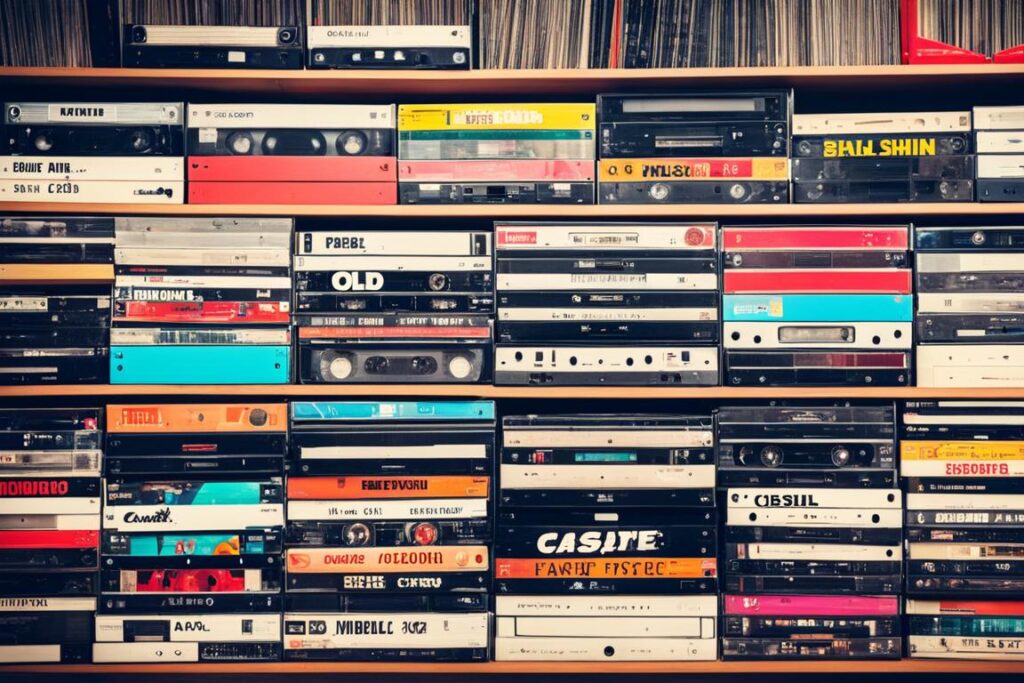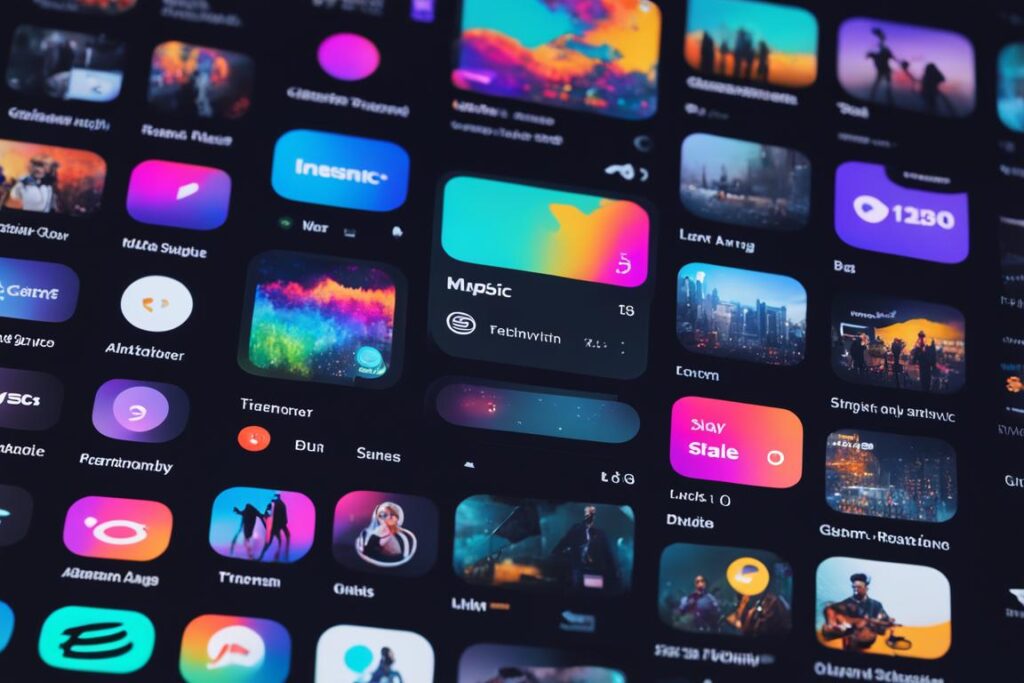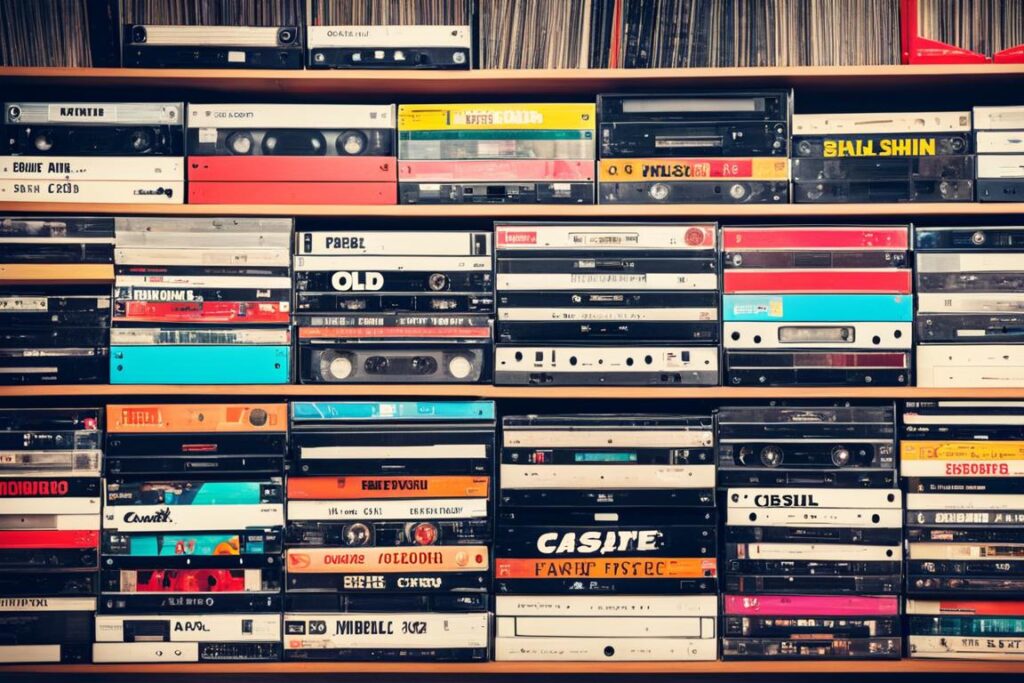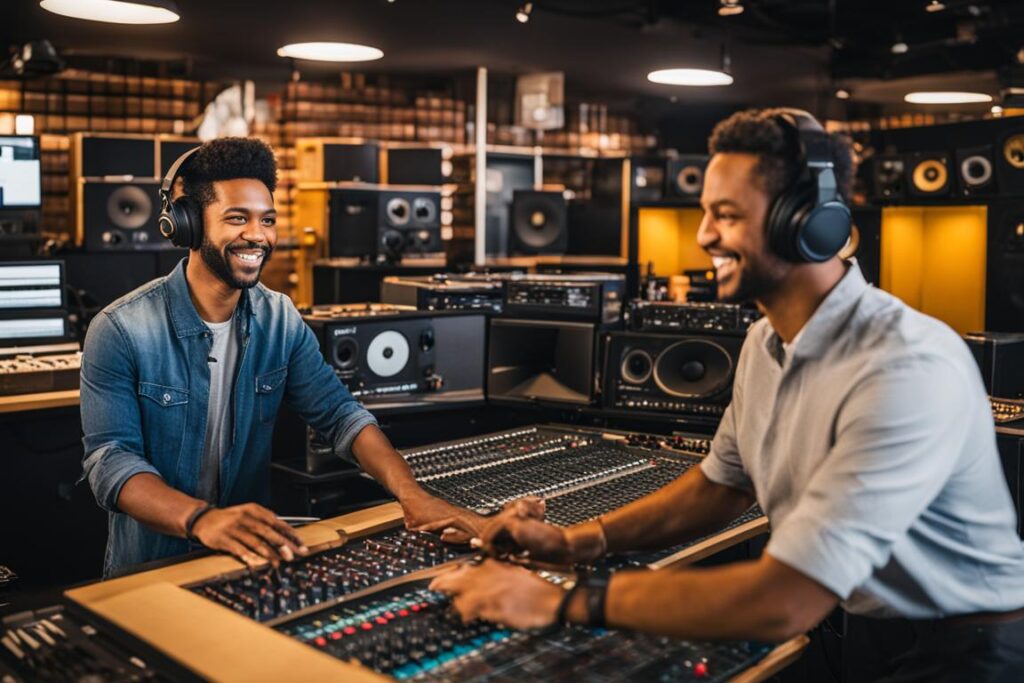How to make money as a musician : As a musician, there are numerous ways you can make money and turn your passion into profit. From selling music and merch to licensing your songs, playing live shows, and offering music lessons, there are plenty of revenue streams available in the music industry. In this article, we will explore the top strategies and tips for musicians to make money and build a successful career.
Key Takeaways:
- Explore various revenue streams in the music industry to maximize your income potential.
- Sell your music as digital downloads and consider offering merchandise alongside it.
- Physical media such as vinyl, CDs, and cassettes still have a market and can be sold to music fans.
- Streaming services can provide a steady income over time, especially with a loyal fanbase.
- Licensing your music for use in media like movies and commercials can be a lucrative source of income.
Sell Your Music as Digital Downloads
One of the most straightforward ways for musicians to make money is by selling their music as digital downloads. Even though streaming has become popular, there is still a market for fans who are willing to pay for songs and albums.
You can create your own online store, use platforms like Sellfy, and sell your music directly to your fans. Additionally, you can also sell merchandise alongside your music, such as t-shirts and other products, to increase your revenue.
Sell Physical Media (Vinyl, CDs, Cassettes)
Contrary to popular belief, physical media like vinyl, CDs, and even cassettes are still in demand. Vinyl sales have seen a resurgence in recent years, and many music fans enjoy collecting and owning physical copies of their favorite albums. Selling your music on these formats can be a lucrative opportunity to reach music fans who value the tangible experience of physical music.
There are several avenues through which you can sell your physical music. Here are some options:
- Live events: Selling your vinyl, CDs, and cassettes at live shows and concerts allows you to connect directly with music fans. Set up a merchandise booth where attendees can browse and purchase your physical music alongside your other merchandise.
- Online store: Create an online store on your website where fans can purchase your physical music. This provides a convenient way for music enthusiasts to order and receive your albums without the need for in-person transactions.
- Platforms dedicated to selling physical media: There are online platforms specifically designed for selling vinyl, CDs, and cassettes. Utilize these platforms to reach a wider audience of music fans who actively seek out physical music. Examples include Discogs, Bandcamp, and Big Cartel.

“Physical media resonates with music lovers who appreciate the tactile experience and collectibility of vinyl, CDs, and cassettes. It’s a way for fans to form a deeper connection with their favorite artists and albums.”
By catering to the preferences of physical music enthusiasts, you can tap into a dedicated market and generate additional revenue as a musician. Remember to consider the cost of producing and distributing physical copies of your music, as well as packaging and shipping logistics.
Comparison of Physical Media Formats
| Format | Advantages | Limitations |
|---|---|---|
| Vinyl |
|
|
| CDs |
|
|
| Cassettes |
|
|
Earn Money by Streaming Music
The music industry has seen a significant shift in recent years, with streaming services like Spotify and Apple Music revolutionizing how people consume music. As a musician, streaming platforms provide an excellent opportunity for you to not only reach a wide audience but also earn money from your music. While the earnings per stream may seem low, building a strong presence on streaming platforms can generate a steady income over time, especially if you have a large number of listeners.
The key to earning money from streaming services lies in maximizing your exposure and engagement. Here are some strategies to help you make the most of music streaming:
- Distribute your music widely: Make sure your music is available on multiple streaming platforms, including Spotify, Apple Music, Amazon Music, and others. This ensures that your music reaches a larger audience and increases the likelihood of earning money from each stream.
- Build a loyal fanbase: Engage with your fans and build a strong connection with them. Encourage listeners to follow you on streaming platforms, create playlists featuring your music, and share your music with others. This not only boosts your streaming numbers but also increases the chances of your music being discovered by new listeners.
- Promote your music effectively: Utilize social media platforms, music blogs, and online communities to promote your music and reach a wider audience. Collaborate with other artists and influencers, submit your music to playlists, and participate in music-related events to gain more exposure.
By implementing these strategies, you can enhance your visibility on streaming platforms and increase your chances of earning money through music streaming. While the earnings per stream may vary depending on the platform and your specific contract, the cumulative revenue can be substantial, especially for artists with a large and dedicated following.
Remember, streaming services offer not only financial benefits but also the opportunity to connect with a global audience and grow your fanbase. It’s crucial to leverage these platforms to establish your presence in the music industry and further your career as a musician.

License Your Music
Monetize your music by licensing it for use in various media. Music licensing offers a fantastic opportunity to earn money when your songs are featured in movies, TV shows, commercials, and other forms of media. By partnering with music licensing companies like Musicbed, you can connect with valuable licensing opportunities that can generate a substantial income.
When you license your music, you grant permission for others to use your songs in exchange for a fee or royalty payment. The licensing fees can vary depending on the scale of the project, but lucrative opportunities abound for talented musicians.
Here’s how the music licensing process works:
- Registration: Submit your music to reputable licensing platforms such as Musicbed. Ensure your music is well-organized with accurate metadata, making it easier for potential clients to find and select.
- Licensing Opportunities: Musicbed and similar companies provide a platform where music supervisors, filmmakers, and other media creators can search for and license music. When your songs align with the needs of a specific project, you have the chance to earn money when your music is chosen.
- Usage Rights: Music licensing encompasses several rights, including synchronization rights (song and visual coordination), mechanical rights (recording and reproduction), and public performance rights. Ensure you have a clear understanding of the rights being licensed and negotiate agreements that protect your intellectual property.
- Royalty Payments: Depending on the licensing agreement, you may receive upfront payment, ongoing royalties, or a combination of both. Royalty rates can vary, so it’s essential to read and negotiate fair terms that align with the value of your music.
The popularity of streaming platforms and the high demand for quality content in the entertainment industry have created unprecedented opportunities for music licensing. By strategically licensing your music, you can reach a wider audience, boost your brand recognition, and earn a substantial income.

Play Live Shows & Cover Gigs
Live performances have always been a significant source of income for musicians. By playing live shows at various venues like clubs, restaurants, festivals, and corporate events, you can earn money from ticket sales, merchandise sales, and performance fees. Additionally, you can also offer cover gigs where you perform popular songs, which can be a great way to attract new audiences and earn extra income.
“Playing live shows allows musicians to connect with their fans on a personal level and create memorable experiences. It’s a chance to showcase your talent, engage with the audience, and build a dedicated following.”
Benefits of Playing Live Shows:
- Opportunity to earn money from ticket sales
- Potential to sell merchandise and increase revenue
- Build a loyal fanbase and connect with your audience
- Network and collaborate with other musicians
- Gain exposure and attract new fans
Types of Live Performances:
| Venue | Description |
|---|---|
| Clubs and Music Venues | Performing at clubs and music venues is a common way for musicians to showcase their talent and reach music enthusiasts. |
| Restaurants and Bars | Playing at restaurants and bars can provide a laid-back atmosphere for both the musicians and the audience. |
| Festivals | Participating in music festivals can expose your music to a large number of people and potentially lead to more opportunities. |
| Corporate Events | Corporate events often hire musicians to provide live entertainment, offering a chance to showcase your talent in a professional setting. |
Playing live shows and cover gigs not only allows you to make money as a musician but also helps you improve your performance skills and stage presence. It’s an essential part of building a successful music career.

Offer Music or Instrument Lessons
If you have expertise in playing a musical instrument or possess a deep understanding of music theory, you have the opportunity to share your knowledge and passion by offering music or instrument lessons to aspiring musicians. Whether teaching in person or online, you can provide valuable guidance and help others develop their skills in a structured and personalized manner.
Teaching music not only allows you to contribute to the growth of aspiring musicians but also provides a rewarding way to earn money as a musician yourself. By charging a reasonable fee for your services, you can turn your passion for music into a profitable venture. Additionally, teaching music can bring a sense of fulfillment as you witness your students improve and succeed in their musical journeys.
Depending on your preference and availability, you can choose to offer one-on-one lessons, group lessons, or even provide online tutorials. Online lessons have become increasingly popular, allowing you to reach a wider audience and teach students from different parts of the world.
The Benefits of Offering Music Lessons:
- Share your passion: Teaching music allows you to share your love for the art form and inspire others to develop their musical skills and creativity.
- Expand your network: Teaching music lessons can help you connect with other musicians, students, and music enthusiasts, expanding your network within the industry.
- Enhance your own skills: By teaching music, you reinforce your own understanding and mastery of the instrument or music theory, continually improving your own skills.
- Flexible schedule: Offering music lessons provides the flexibility to set your own schedule, allowing you to manage your time effectively and pursue other musical endeavors.
- Contribute to music education: As a music teacher, you play a vital role in nurturing the next generation of musicians and contributing to the overall music education ecosystem.
Whether you’re an accomplished musician or a passionate music theory enthusiast, offering music or instrument lessons is a fulfilling way to share your expertise, earn income, and make a positive impact on aspiring musicians.

| Music Lesson Options | Price Range | Teaching Format |
|---|---|---|
| One-on-One Lessons | $30-$100 per hour | In-person or online |
| Group Lessons | $15-$50 per hour per student | In-person or online |
| Online Tutorials | $20-$70 per hour | Virtual lessons via video conferencing platforms |
Sell Your Knowledge through Online Courses
In addition to offering one-on-one lessons, you can also create and sell online courses to share your musical knowledge with a broader audience. Platforms like Podia and Thinkific allow you to create and sell video courses on various topics, such as music theory, composition, or instrument tutorials. Online courses can be a passive income source, as you create the content once and sell it repeatedly.
With online learning becoming increasingly popular, there is a demand for high-quality music courses that can be accessed conveniently from anywhere. By leveraging your expertise and teaching skills, you can create comprehensive courses that cater to the needs of aspiring musicians and music enthusiasts.
Here are some key benefits of selling online music courses:
- Reach a wider audience: Unlike one-on-one lessons, online courses have the potential to reach students from all around the world. This allows you to expand your reach and connect with a diverse community of learners.
- Generate passive income: Once you have created and launched your online course, it becomes a source of passive income. As students enroll and purchase your course, you can earn money without actively trading your time for it.
- Establish yourself as an expert: By creating and selling online courses, you position yourself as an authority in your field. This can enhance your reputation as a musician and open doors to new opportunities, such as speaking engagements or collaborations.
- Flexible teaching schedule: Unlike traditional teaching formats, online courses allow you to set your own schedule. You can pre-record lessons, create downloadable resources, and let students progress at their own pace.
When creating online music courses, it’s crucial to structure your content effectively and engage your students. Break down complex concepts into digestible modules, include practical exercises, and provide ongoing support through discussion forums or group sessions.
Remember: Your goal is to provide value and empower your students to grow and develop their musical skills.
Example Table: Comparison of Popular Online Course Platforms
| Platform | Features | Pricing |
|---|---|---|
| Podia | Easy course creation, built-in sales pages, email marketing integrations | Plans start at $39/month |
| Thinkific | Customizable course templates, advanced quizzes and surveys, affiliate marketing tools | Plans start at $49/month |
| Teachable | Powerful course builder, drip content scheduling, student engagement features | Plans start at $29/month |
When choosing an online course platform, consider factors such as ease of use, customization options, marketing capabilities, and pricing. Evaluate multiple platforms to find the one that best aligns with your specific needs as a music educator.

Sell Sound Effects
If you have skills in sound design and music production, you have an excellent opportunity to monetize your talent by creating and selling sound effects. Sound effects are in high demand and can greatly enhance various forms of media, such as YouTube videos, films, and video games.
By creating unique and high-quality sound effects, you can offer content creators a valuable asset that will make their projects stand out. Whether it’s the sound of a thunderstorm, a futuristic laser blast, or an eerie ghost whisper, your sound effects can add depth and realism to any audiovisual experience.
You can sell your sound effects individually or bundle them together in packs to cater to different needs and budgets. There are several platforms where you can sell your sound effects, such as AudioJungle, which provides a marketplace specifically for audio-related digital assets. Additionally, you can also set up your own website to showcase and sell your sound effects directly to customers.
When creating sound effects to sell, it’s important to focus on quality and originality. Take the time to experiment with different sound recording techniques, synthesis methods, or sample manipulation to create unique and captivating sounds. Pay attention to market trends and customer feedback to stay relevant and offer in-demand sound effects.
Benefits of Selling Sound Effects
There are several benefits to selling sound effects:
- Passive Income: Once you’ve created and uploaded your sound effects to the marketplace, you can earn money from sales without ongoing time investment.
- Expand Your Reach: By selling your sound effects online, you can reach customers worldwide, expanding your potential customer base.
- Showcase Your Skills: Selling sound effects allows you to showcase your creativity and expertise in sound design, attracting potential clients for other music production or audio-related projects.
Remember to promote your sound effects through social media, online communities, and collaborations with content creators. Building a solid reputation within the industry can lead to recurring sales and opportunities for custom sound design projects.

By leveraging your skills in sound design and music production, you can tap into the growing demand for high-quality sound effects. Whether you choose to sell your sound effects individually or as part of a pack, focus on creating unique and compelling sounds that will elevate the audio experiences of content creators around the world. Start exploring the exciting world of selling sound effects today!
Sell Merchandise
Selling merchandise is a popular revenue stream for musicians. When fans buy music merch, they not only support their favorite artists but also get tangible items to show their devotion. Designing and selling merchandise like t-shirts, hoodies, posters, and other products featuring your brand or artwork can be a lucrative addition to your income as a musician.
Print-on-demand services like Sellfy and Printful make it easy to create and sell merchandise without the need for upfront inventory. With print-on-demand, you simply upload your designs, and these services handle the printing, packaging, and shipping. This allows you to focus on your music while still generating merch sales.
Selling merchandise can be done online through your website or at live events like concerts and festivals. By having a strong online presence and offering a variety of merch options, you can reach a wider audience and increase your sales. Additionally, setting up a merch booth at live events provides an opportunity to engage directly with fans and create memorable experiences.
Print-on-Demand Services Comparison
| Print-on-Demand Service | Features | Pros | Cons |
|---|---|---|---|
| Sellfy |
|
|
|
| Printful |
|
|
|
By leveraging the power of print-on-demand services, you can offer a wide range of music merch options to cater to different fan preferences. Remember to create compelling designs that align with your brand and connect with your audience. With a strong merch strategy, you can boost your income as a musician while building a loyal fanbase.

Conclusion
As we have explored in this article, there are numerous musician revenue streams available for monetizing a music career and generating a sustainable income in the music industry.
By leveraging these strategies and being creative in your approach, you can turn your passion for music into a profitable venture. Selling your music as digital downloads, physical media, and through streaming services can generate income while expanding your fan base.
Additionally, licensing your music for use in movies, TV shows, and commercials provides another lucrative avenue for making money. Playing live shows, offering music lessons, and creating online courses allow you to share your expertise while earning a steady income.
Don’t forget the power of merchandise sales, such as t-shirts and posters, to supplement your revenue. By combining these revenue streams and consistently delivering high-quality music and services, you can build a successful career in the music industry while making money as a musician.
Also Read : Megalovania Sheet Music For Piano & More
FAQ
Q: How can I make money as a musician?
A: There are several ways to make money as a musician, including selling music, music licensing, having a YouTube channel, working with a record label, and music production.
Q: What are the best ways to make money from music online?
A: Some of the best ways to make money from music online include selling music online, raising money through crowdfunding, and selling merch related to your music.
Q: How can I make a living as a musician?
A: You can make a living as a musician by composing music for others, performing live, making money from YouTube, and selling your music directly to fans.
Q: What are the ways to make some extra money as a musician?
A: You can make some extra money as a musician by promoting your online store, getting your music discovered, and having your music played on non-interactive music streaming platforms.
Q: How can I generate good money from my music?
A: You can generate good money from your music by getting involved in music distribution, having your music played on various platforms, and working with a reputable record label.
Q: What are the options for making decent income from music?
A: You can make a decent income from music by performing live, working with a record label, and having your music licensed for use in various media.
Q: What is the process to raise money through music?
A: You can raise money through music by uploading your music on platforms that allow fans to support you financially or by organizing events and concerts to raise funds.
Q: Can I make money from my YouTube channel as a musician?
A: Yes, you can make money from your YouTube channel as a musician by monetizing your videos, getting ad revenue, and promoting your music to a wider audience.
Q: How can I make money by selling merch related to my music?
A: You can make money by selling merch related to your music by setting up an online store, promoting your merchandise at events, and connecting with your fans through exclusive merchandise offerings.
Q: What are the opportunities for making cash from music production?
A: You can make cash from music production by offering your services to other musicians, creating custom music for various projects, and collaborating with other artists on production work.















